





















































CELEBRATING 120 YEARS OF CO-OPERATIVE WORKING


























































CELEBRATING 120 YEARS OF CO-OPERATIVE WORKING



More details on www.saos.coop
Aberdeen Grain Storage Ltd
01651 882244
www.aberdeengrain.co.uk
Angus Growers 01241 877336
www.angusgrowers.co.uk
ANM Group Ltd 01467 623700
www.anmgroup.co.uk
Ardler Potato Co-operative Ltd
Argyll Hill Lamb 01852 316220
www.argyllhilllamb.com
Aspatria Farmers 01697 320207
www.aspatriafarmers.co.uk
Ayrshire Country Lamb Ltd 01292 560740
www.farmstock.org.uk
Banff and Moray Grain Marketing Ltd
c/o RA Clements Assoc 01631 562643
BATA Ltd 01653 605200
www.bataltd.co.uk
Birsay Farmers Ltd 01856 874654
Borders Machinery Ring Ltd 01896 758091
www.ringleader.co.uk
Co Chomunn An Lochdair 01870 610205 www.carnanstores.co.uk
Dalkeith Farmers Ltd 01875 820810
DWP Harvesting Ltd 01339 885335
www.dwpharvesting.co.uk
East Lothian Potatoes Ltd 01361 883488
East of Scotland Farmers Ltd 01828 627264
www.eosf.co.uk
East of Scotland Growers Ltd 01334 654047
www.eastofscotlandgrowers.co.uk
Farm Stock (Scotland) Ltd 01750 723366
www.farmstock.org.uk
First Milk 0141 887 6111
www.firstmilk.co.uk
First Venison Ltd 01507 353770
Galloway Lamb Ltd 01899 221419
www.farmstock.org.uk
Girvan Early Growers Ltd 01465 715328
Grainco Scotland Ltd
01888 564190
www.grainco.co.uk
Grampian Growers Ltd 01674 830555
www.grampiangrowers.co.uk
HBS Ring Ltd 01463 811603
www.hbsring.co.uk
Highland Grain Ltd 01463 811435 www.highlandgrain.co.uk
Lewis Crofters Ltd 01851 702350
www.lewiscrofters.co.uk
Lothian Lamb and Beef Ltd 01501 823151
www.farmstock.org.uk
Lothian Machinery Ring Ltd 0131 339 8730
www.lothianmachineryring.co.uk
Milk Suppliers Association 01988 700240
www.msa.scot
North Uist & Benbecula Livestock Marketing 01876 500329
Oban Livestock Centre Ltd c/o Ritsons CA 01542 832212
Orkney Auction Mart Ltd 01856 872520
www.orkneymart.co.uk
Orkney Business Ring Ltd 01856 879080
www.orkneybusinessring.co.uk
Orkney Cheese Company Ltd 01856 872824
www.orkneyfoodanddrink.co.uk
Perth Farmers’ Market enquiries@perthfarmersmarket.co.uk www.perthfarmersmarket.co.uk
Ringlink (Scotland) Ltd 01561 377790 www.ringlinkscotland.co.uk
Rural Services Scotland Ltd 01738 550101 www.scotlandfarmer.co.uk
Saltire Seed Ltd 01358 742000 www.saltire-seed.co.uk
Scotlean Pigs Ltd 01228 541566 www.scotlean.co.uk
Scott Country Lamb Ltd 01835 840283 www.farmstock.org.uk
Scott Country Potatoes Ltd 01573 225125
Scottish Agronomy Ltd 01577 862759 www.scottishagronomy.co.uk
Scottish Borders Produce Ltd 01890 751663 www.scottishbordersproduce.com
Scottish Organic Milk Producers Ltd enquiries@scottishorganicmilk.org www.scottishorganicmilk.org
Scottish Organic Producers Association Ltd 0131 335 6606 www.sopa.org.uk
Scottish Pig Producers Ltd 01466 792284 www.scottishpigs.coop
Scottish Potato Co-op 07793 057870
Scottish Quality Crops info@scottishqualitycrops.co.uk www.sqcrops.co.uk
Scottish Shellfish Marketing Group Ltd 01698 844221 www.scottishshellfish.co.uk
Seed Potato Organisation Ltd c/o NFU Scotland 0131 472 4000
Shetland Abattoir Co-operative Ltd 01595 696300
Shetland Livestock Marketing Group Ltd 01595 696300 www.slmg.co.uk
Tarff Valley Ltd 01557 820247 www.tarffvalley.co.uk
Tayforth Machinery Ring Ltd 01577 830616 www.tayforth.co.uk
United Farmers Ltd 0131 334 3111 www.unitedfarmers.co.uk
United Oilseeds Marketing Ltd 01380 729200 www.unitedoilseeds.co.uk
As you’ll have gathered from our front cover, this annual report marks 120 years since SAOS was established in 1905 as a co-operative society to further organised agriculture in Scotland (the Scottish Agricultural Organisation Society).




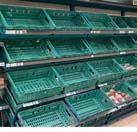







Despite 120 years having passed, it’s interesting to note from our first annual report that, whilst how we undertake our work and some of today’s workstreams would be beyond our forebearers’ imagination, we remain focused on the benefits of co-operation and the cooperative principles to further farmers’ power in their supply chains. And that, more generally, all our work has at its core the belief that solutions lie in getting the right people together and working more effectively towards shared goals.
We know we’re not the only ones to be talking up the benefits of co-operation and collaboration these days. We’re delighted that others have grasped the power

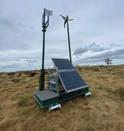
and possibilities of working ‘more cooperatively’. But we are proud that SAOS has worn its heart on its sleeve since its first annual report in 1905, declaring “The Society was formed in order to develop the organisation of agriculture in Scotland through co-operative purchase of the materials, and manufacture and sale of the products of agriculture, and through similar undertakings, in which advantages may be obtained for farmers by combined efforts.
“This Society was designed, not to engage in trade, but to foster the formation of trading associations and to popularise and advocate the idea of a better organisation of the manufacturing and commercial side of agricultural work.”

In its first year, SAOS was instrumental in forming seven co-operative societies. Three in Orkney, one each in Cupar, Ayrshire, Aberdeen, and Durris, Aberdeenshire. The oldest co-op in Scotland, Tarff Valley, had affiliated to our English cousins before SAOS was established but joined us before long and is our oldest surviving member.
Our membership numbers have ebbed and flowed, at one stage numbering several hundreds of co-op members, so we’ve helped countless co-ops, large and small, over the years. In more recent years, we’ve grown and developed new workstreams and subsidiary businesses, having identified areas where a more collaborative approach is vital for the greater good of Scottish agriculture and rural Scotland.
In this, the United Nations’ International Year of Co-operatives, we are justly proud of our co-operative roots and our co-op members, and of continuously striving to meet the next challenge, working together to shape the future, today.
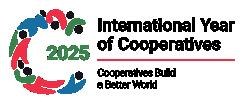
The seven Co-operative Principles are the guidelines for all co-operatives globally, putting their values into practice, and ensuring their democratic structure, and promoting community engagement.
How SAOS embodies these:
Voluntary and open membership
• Owned by 57 members of various co-op types and sizes (from 3 to 5000+ members) operating in a wide range of farming sectors in the mainland and islands of Scotland and parts of England
• Affordable affiliation fees linked to co-op size and membership throughput
• We’ve welcomed new members this year from potato storage, inputs and supplies, and farmers market sectors
Democratic member control
• Sixteen elected co-op members participate in the SAOS Council, with three meetings each year focusing on relevant topics such as member-derived insight on future SAOS Training and Development strategy, and opportunities and threats within the food and drink supply chain
• SAOS Board is member-focused, comprising between 8 and 12 Directors
• Our culture is that of open and approachable access between Board Directors and the SAOS team
Member economic participation
• Payment of annual affiliation fees
• Engaging SAOS to provide professional governance services
• Contracting SAOS to undertake Company Secretary role
• Paid attendance at SAOS training and events
Autonomy and independence
• SAOS, a federal co-operative, retains operational independence by undertaking relevant consultancy and development work, and through the strategic establishment of incomegenerating subsidiaries
Education, training, and information
• SAOS’s varied training courses for members include governance matters, business operations, and leadership development through Growing Tomorrow’s Leaders
• Broader knowledge exchange is developed via C2N, and events such as our Annual Conference
• Member forums are a much-valued knowledge exchange opportunity - for Chairpersons, Managers and Assistant Managers, and the Next Generation
• Circulating member briefing notes on relevant industry topics
• Circulating Quarterly SAOS Update with news from and for members
Co-operation amongst co-ops
• Meetings and liaison with Co-ops UK, ICOS and ICA
• Multi-member collaborative projects
• Close liaison with the co-operative academic world such as Dundee Business School and St Mary’s University, Nova Scotia
Concern for community
• Partnership with agricultural support charity, RSABI
• Governance support for farmer wellbeing programme, Farmstrong Scotland
Rory Christie
In my first year as Chairman of SAOS I am delighted to have had the benefit of their strengths to help the Milk Suppliers Association become a Dairy Producer Organisation (PO) and, working closely with Selkley Vale, MMG Dairy Farmers and Davidstow Creamery Direct, towards becoming an Association of Dairy POs.
Co-operation, for me, is a complete ‘no brainer’. Working together is paramount for farmers to gain more power in their supply chains and help weather the storms that seem to come at us with remarkable frequency these days, both literally and metaphorically.
Our pig co-op members, Scottish Pig Producers and Scotlean Pigs, also made a great co-operative stride forward for their members this year, coming together with Thames Valley Cambac (TVC) to form the United Pig Co-operative, streamlining operations, reducing costs, and strengthening their footing in the marketplace.
Tim Bailey
We heard about these, and similar successes in the soft fruit and crops sectors, at the SAOS Conference, and we know that our member co-ops in every sector are bringing multiple benefits to their farmer members. Co-operation continues to be the optimum business model for long-term success.
We are delighted to see wider recognition of this growing, and that our influence and respect at all levels of the supply chain and government continues to increase, particularly with the prospect of new Scottish Government support for cooperatives within the tier three funding.
I’ve long valued the organisation for its focus on solutions rather than problems,
“Resilience, resilience, resilience!” is becoming the new mantra within our food and farming sector, just as it did within the property market. Brexit, Covid, and the war in Ukraine have brought the importance of supply chain resilience to the fore over the past five years, and this trend looks set to continue as the world adapts to the new turbulence of the Trump era. But it is more than a catch phrase, it is a need, in fact a pre-requisite, for our industry.
SAOS leads work on this within the Scotland Food & Drink strategic workstreams which is now providing insight into what resilience really means for our industry. It enables us to determine how best to measure it and how we can use it to target supporting interventions, not only to aid business, sector, and supply chain survival, but also to be a platform for growth. And, of course, key characteristics of resilience building are co-operation and collaboration.
Co-operatives have been living and breathing resilience since their founding. Managing market demand and supply,
pooling risk, aligning customer needs, and professional fulfilment, these are all key contributors to resilient supply chains. Co-ops have an ever-growing role to provide stability and ‘shock absorption’ for our farming and food sector and, in recognition of this importance, we now have a Scottish Agricultural Act with strategic provisions in place to support co-operation.
It’s critical that SAOS can work with the Scottish Government and industry partners to use the ‘tools’ within this new legislation to support our member co-ops in delivering resilience for our farming
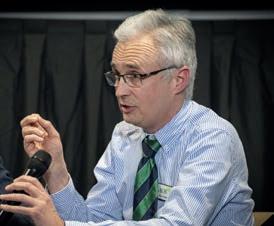
because that’s what our members need on an everyday basis. SAOS as a group business continues its steady trajectory towards meeting its financial targets, which in turn will fund our core vision for growing and enabling co-operation in the farming supply chain.
I thank the staff team for their enthusiasm for finding new ways to help our members and the wider food and drink industry, and the Board, for their support in what has been a challenging but very positive year.

sector. More co-operation will lead to greater resilience, and through this we can maintain critical mass, increase the value farming receives from the supply chain, and help derisk our farming sectors. With that, comes “Success, success, success!” and the size of the prize is substantial.
This year has been of great significance in that, following considerable advocacy work with Scottish Government, MSPs and departmental officials to encourage the inclusion of supportive measures for co-operation within the legislative programme, farmer co-operation is now embedded in Scots agricultural law.
Various constructive elements are now embedded within the Agricultural and Rural Communities (Scotland) Act 2024. This includes a requirement for Scottish Ministers to reflect the positive benefits that agricultural co-ops provide, and to underpin and support this through measures within future Rural Support Plans: in essence, providing the means for co-ops to be eligible for relevant programme support and funding. There are also explicit references to co-op eligibility for funding applications and joint projects, and continuation of the Fruit and Vegetable Aid Scheme and associated support for our three Producer Organisation co-ops.
We completed a substantial amount of member-focused work, including strategic reviews, governance planning and training, company secretarial support, member surveys, rules revisions, and Chair and Manager Forum meetings. In addition, there has been specialist business restructuring support for a few different members and positive engagement with sister organisations, ICOS and Co-ops UK.
SAOS itself undertook a survey of our co-op members during 2024. This is vital to ensuring we have a detailed perspective on the priorities and concerns of our ‘owners’: what we have been doing well and what we could improve upon. We had a good response rate with feedback from 63% of our members. This included a good representative spread of member size, sector, and location. The feedback identified member engagement and loyalty, market/business development, and staff recruitment and retention as the three key priorities.
We continued the Co-op Growth and Innovation service for our members. The primary activity underpinning this work was conducting business reviews to
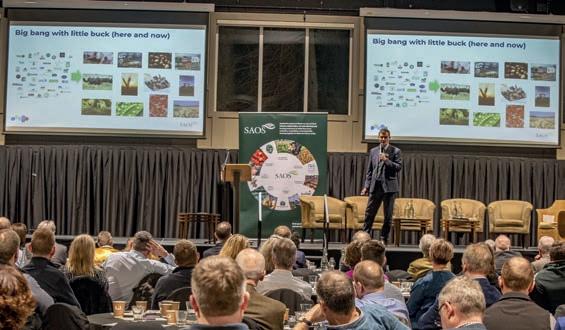
identify barriers, future ambitions, and to agree development plans. The findings of the yearly reviews were analysed to identify key themes. Identified and agreed themes and development needs have then formed the foundation of bespoke activities to identify common themes to attract partnership funding, feed through to C2N ‘lighthouse’ projects that need scoped, or launch specific initiatives such as our Planning to Succeed employment training.
During the last year we have welcomed three new members: Brandsby’s Agricultural Trading Association (BATA), Ardler Potato Co-op, and Perth Farmers’ Market. We also worked closely with various stakeholders in establishment of a new Orkney abattoir co-op to support development of a new red meat facility and, in turn, livestock farmers and butchers in the islands. We have also played a pivotal role supporting the work of our dairy co-op member, the Milk Suppliers Association, with Davidstow Creamery Direct, Selkley Vale, and MMG Dairy Farmers, to form an Association of Dairy Producer Organisations (APO).
The team has continued to provide dedicated sector support to various food and farming Groups which have over two
hundred businesses between them. The groups include the Fine Cheesemakers of Scotland; Scottish Venison Association; Scottish Apple Producers; Flowers Grown in Scotland; Scottish Honeyberry Growers Association; and Scottish Smallholders. Work includes supporting them with organisational development, strategy planning, and facilitating group activity such as meetings and events.
Training support for our members and the wider sector continues to be an important activity for the team. In the last year we have organised and/or delivered training for topics including: Negotiation and Dispute Resolution; the Art of Communication; Pre-Apprenticeship Mentor Training with Lantra and Ringlink; and CyberSecurity. The third year of our pivotal Growing Tomorrows’ Leaders programme completed in March, with a full cohort of 16 participants ‘graduating’ from various co-ops and rural/agri businesses. We also delivered three ‘Planning to Succeed’ employment workshops, in collaboration with Greenburn HR, with a group that includes co-op staff and farmer directors, and from other agricultural businesses. These sessions covered recruitment, retention, and optimising performance of team staff.
SAOS supply chain activities continued to develop in the past year. This included expanding existing workstreams and trialling several new ones.
The primary area of development work was within the Scotland Food & Drink Partnership, where SAOS is the strategic lead for the pivotal Supply Chain Security workstream. This second year of strategic leadership saw the consolidation of the pioneering supply chain surveillance and risk register work and two new areas of activity initiated. These included innovative resilience workstreams and the new Sourcing for Growth initiative.
The ultimate mission of the resilience activity is to help build a dynamic food and drink industry, better able to withstand market volatility, economic shocks, and supply chain disruption, and respond proactively to market growth opportunities on those ‘solid foundations’. The primary work has included development of a resilience tracker that helps identify characteristics that indicate resilience, developing a method for measuring this, tracking changes over time, identifying areas of weakness, and developing supporting interventions. This work resulted in the creation of an assessment tool with 42 weighted indicator questions utilised across 15 sectors and evaluated by a panel of independent experts. This led to eight key criteria or markers that covered diverse areas such as inputs, markets, systems, performance, sector collaboration, supply chain flexibility, sustainability, and people. Similar work is now being undertaken at an individual business/supply chain level and is being trialled with several co-ops including those in the pig, soft fruit, vining pea, and shellfish sectors.
Another new area of activity was the launch of the Sourcing for Growth initiative. This programme connects food manufacturers with local producers of high-quality Scottish produce to help businesses grow through access to new markets or customers. With Scotland importing up to 40% of the food and drink we consume, research using HMRC

import statistics and other sources has identified potential import substitution opportunities totalling up to £2.5bn for Scottish supply chains. Some of these goods, and thereby some of this value, can be produced in Scotland. An assessment tool has been developed with the help of partner organisations to assess opportunities within each sector, providing a strategic insight into substitution potential to assess their capacity to respond. A support platform has been launched and is now available through the SAOS website, where buyers and suppliers can access support.
SAOS provided strategic support for the co-ordination of Geographical Indication (GI) schemes in Scotland and delivery support for the Scottish Government and the Scotland Food & Drink Partnership. This work has included various discussions with partners and stakeholders interested in exploring GI applications and advice to support them progressing these. Prospective applications include bakery, top fruit (grown on trees), soft fruit, fish, and honey products.
We continued to support the Dairy Growth Board in the delivery of their new strategy. This has included provision of dairy supply chain insights and post
event support following an inward mission of buyers from Morocco interested in purchasing fresh milk for processing.
SAOS had another successful year hosting the Scottish Agri Export Hub, which helps to explore new market opportunities for seed potato, soft fruit, and artisanal cereal growers. Hosting a three-day inspection (pictured) by Jordanian Ministry of Agriculture officials of the Scottish seed potato sector, enabled them to visit suppliers, and attend meetings at SASA headquarters, to see protocols and testing measures ensuring seed potatoes leave Scotland with their high health, high quality status intact. Jordan is a relatively new export market and the official inspection will allow maximisation of that potential export opportunity. Initial feedback suggests the market will increase to ~£3m of exports in 2025 with potential for £8m within three years.
Finally, our extensive supply chain mapping work continues to be valued by industry, now providing information on environmental sustainability, in addition to emerging supply chain risks and positive/ negative trends. This valuable surveillance ultimately helps underpin all our other supply chain work.
Our work has continued on various environmentally-focused projects, and we’ve also embarked on several new ones this year.
The ‘Data Driven Decision in Potatoes’ Knowledge Transfer and Innovation Fund (KTIF) project successfully completed its third year with the Scottish Potato Co-op (SPC). Key activities involved supporting a Benchmarking Group (using AHDB Farmbench), conducting farm carbon audits (Agrecalc), estimating nitrogen use efficiency, and producing standard operating procedures for ware potato production to fast-track learning and performance improvement.
A new ‘Water Resource Management in a Changing Climate’ KTIF project started last summer which also involves supporting SPC. This first year of the project involved interviewing co-op members to understand their sources, storage, and applications of water for crop irrigation. The next stage has involved identifying existing practices and innovations that could be adopted in future, when water is predicted to be scarcer in the summer, which will affect the quality and yield of the potatoes produced.
The EU Horizon Project on Intercropping Values continued for a third year. This involves working, in partnership with SRUC as academic lead, to explore and promote the benefits of intercropping as an agronomy system to reduce fertiliser and agrochemical use, tackle climate crisis, and biodiversity loss. This four-year project involves a total of twenty-seven partners from fifteen varied countries including China and Mozambique, with activity including organising a group meeting to visit farmers growing organic oil seed rape crops.
The Naturally Scottish marketing campaign was developed by the Scotland Food & Drink Partnership (SF&D) and launched earlier in the year, focusing on communicating Scotland’s underpinning sustainability assets and credentials. SAOS, in collaboration

with our FIA colleagues, completed a meticulous sustainability-focused gap analysis exercise to substantiate the sector’s sustainability credentials. This exercise benchmarked twenty-five quality assurance schemes used within Scotland’s agri/aquaculture and seafood industries against the Sustainable Food Trust’s Global Farm Metric (GFM). The goal was to highlight the progress that Scottish agri/aquaculture has been making and bolster the SF&D Partnership’s Naturally Scottish brand (pictured). During the gap analysis process, SAOS also adapted the GFM to include metrics relevant to aquaculture and downstream supply chains, ensuring a comprehensive and credible assessment. Alongside the gap analysis work, a summary document has been developed highlighting some of Scotland’s key food and drink sustainability credentials and outlines the approach SAOS took to benchmark against the GFM.
SAOS has also been able to contribute to a range of other aligned projects, including providing advice and support to the Soil Association regarding their Improved Governance Mechanisms for whole farm and farm cluster natural capital projects; Scottish Government’s Water Resource Roundtable; industryled ‘Carbon Sequestration and Cattle’ initiative; and facilitating support for the SF&D Partnership’s Sustainability Strategy workshop.
Food Integrity Assurance has had another successful year supporting Scottish Land and Estates with their pivotal Wildlife Estates Scotland (WES) initiative. WES aims to promote the best habitat and wildlife management practices, build recognition, and raise standards through the introduction of an objective accreditation system. This includes promoting best practice in wildlife and habitat management; gathering information on species and their habitats; wildlife management; conservation projects; and integration with other land uses to monitor continuous improvement and encourage proactive conservation projects. FIA supports the WES initiative’s integrity by providing the independent verification and audit service to underpin the scheme.
The member Co-op Sustainability and Resilience programme progressed, providing a proactive framework to enable positive change. This includes development of co-op sustainability action plans, and reviews, to bring clarity and prioritise actions that can be aligned and embedded within the wider business strategy. This will ensure sustainability is seen not as ‘an extra’ but as an integral function in developing a resilient, efficient, and responsible business appealing to customers and stakeholders alike.
The critical role and importance of farm-derived data continues to be a core focus for SAOS activity. The most explicit example of this is our continued development of ScotEID capability as a user-focused and cost-effective service, uniquely delivered as a private/public partnership between industry and Government.
It is now over three years since responsibility for managing cattle registration and movement services transferred from BMCS to ScotEID. In the last year, over 40,000 phone calls have been handled; over 100,000 individual events (birth, moves, deaths) recorded or updated from calls and emails made to the office; and over 500,000 cattle passports issued. This is all professionally managed from the small office team in Huntly, comprising just ten full-time staff with support from another 12 part-time colleagues.
MyHerdStats data herd management tool has been further refined in the last year. This included creation of a new individual summary dashboard, herd calving interval tables, and stocktake and livestock reconciliation reports. Over 3500 Scottish cattle keeper holdings have engaged with MyHerdStats over the last year.
There have been further successful outcomes of ScotEID’s partnership with the Scottish Government, with the launch of two new livestock data systems. This has comprised a new Avian Registration Hub (ARH) and the Scottish Kept Birds Register (SKBR). The ARH provides a cloud-based platform to enable the Scottish Government to fulfil its legislative responsibilities more efficiently, including holding inspection data and enabling almost 400 registered poultry businesses to undertake online applications and update and access data relating to their business. ARH covers 668 premises, holding over 7 million chickens. The SKBR was launched on 1 September 2024, enabling all keepers of birds to fulfil their legal obligation to register their flock and premises. In addition to poultry, this includes pet birds, game birds, racing pigeons, birds of prey, and waterfowl. The information provided helps the Scottish Government to send vital biosecurity information to minimise the risk of the
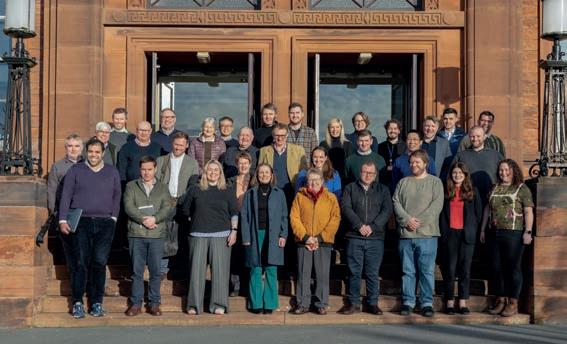
spread of disease, along with disease control information, where premises are affected, by a disease control zone. It also allows quicker and more effective containment and eradication of notifiable avian diseases, such as highly pathogenic avian flu. Over 10,600 keepers are now registered on the SKBR, covering over 15,000,000 birds, with chickens representing ~86% and pheasants ~10% of the total.
Agricultural data activity hasn’t just been restricted to ScotEID. SAOS’s C2 Network is now playing a pivotal role, working with industry partners in exploring the potential from Earth Observation data. At the end of 2024, C2Network was invited to participate in the ‘Unlocking Space-Derived Data for Opportunities Across Scotland and East Anglia’ project (pictured). This is a project funded through the UKSA Space Cluster Partnership with Space Scotland, Space East, and South of Scotland Enterprise as partners. SAOS is now involved in a consortium addressing a farmer-inspired innovation challenge, focused on developing a satellite-driven risk profiling tool.
SAOS’s digital data technology business, SmartRural, has had a busy year driving
forward two existing projects. The Scottish Government-funded Data Digital Pilot has just completed its third year with 49 wireless gateways installed on 40 cattle farms throughout the mainland of Scotland and the Northern and Western Isles. This has enabled the use of sensor technology to capture strategic farm data to support improved animal health, welfare, and environmental monitoring.
Building momentum this year, the Huntly 5G Network project, funded by the Aberdeen City Regional Deal, involves identifying technology options and eligible applications for 5G connectivity in rural settings. This has included testing complementary technology that leverages 5G connectivity to overcome some if its limitations. Work included deploying next generation fixed-wireless technology that potentially provides gigabit solutions in areas that are never likely to receive fibre connectivity. Additional work has involved exploring rural use cases for 5G connectivity, including CCTV monitoring, veterinary health surveillance, public Wi-Fi installations in community spaces, and novel ‘pop-up’ Wi-Fi systems for use at remote rural events.
In addition to our Board, SAOS also has a Council, comprising co-op members from all sectors, and other key industry bodies. This gives us another level of governance, keeping us in tune with member business needs and wider industry issues, and helping to shape our future work.
Michael Bayne Borders Machinery Ring
Rob Mitchell Scottish Shellfish
Richard Butterworth Scotlean Pigs Ltd
Sarah Millar QMS
Anne Rae Macdonald HBS Ring Ltd
Rod Sanderson Tarff Valley Ltd
SAOS Council comprises our Board (below) together with:
Penny Montgomery SAYFC
John Davidson NFU Scotland
Amanda Brown Scotland Food & Drink
Peter Chapman Ringlink
Liz Barron-Majerik Lantra Scotland
Ruth Taylor WWF
David Bell Next Generation
Scott Calderwood First Milk
Angela Porchez Angus Growers
Patrick Hughes SAOS
Teresa Dougall Scottish Quality Crops
The success of SAOS, like every co-op, depends on how well its directors carry out their roles and responsibilities, and we are delighted that SAOS’s Board has a wealth of knowledge and experience supported by skills training and development, as well as an ambitious vision for our future.
SAOS Board Members









Our Council feeds into the Board, who then shape our focus and direction of travel, enabling the team, SAOS’s greatest asset, to strengthen the profitability and effectiveness of Scotland’s food, farming and rural co-ops and businesses.
Every member of the SAOS team is valued and empowered, and each has a unique skill set and wide networks, enabling them to add benefit in many different ways across multiple sectors and workstreams as required.









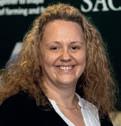














E-mail: saos@saos.coop Web: www.saos.coop